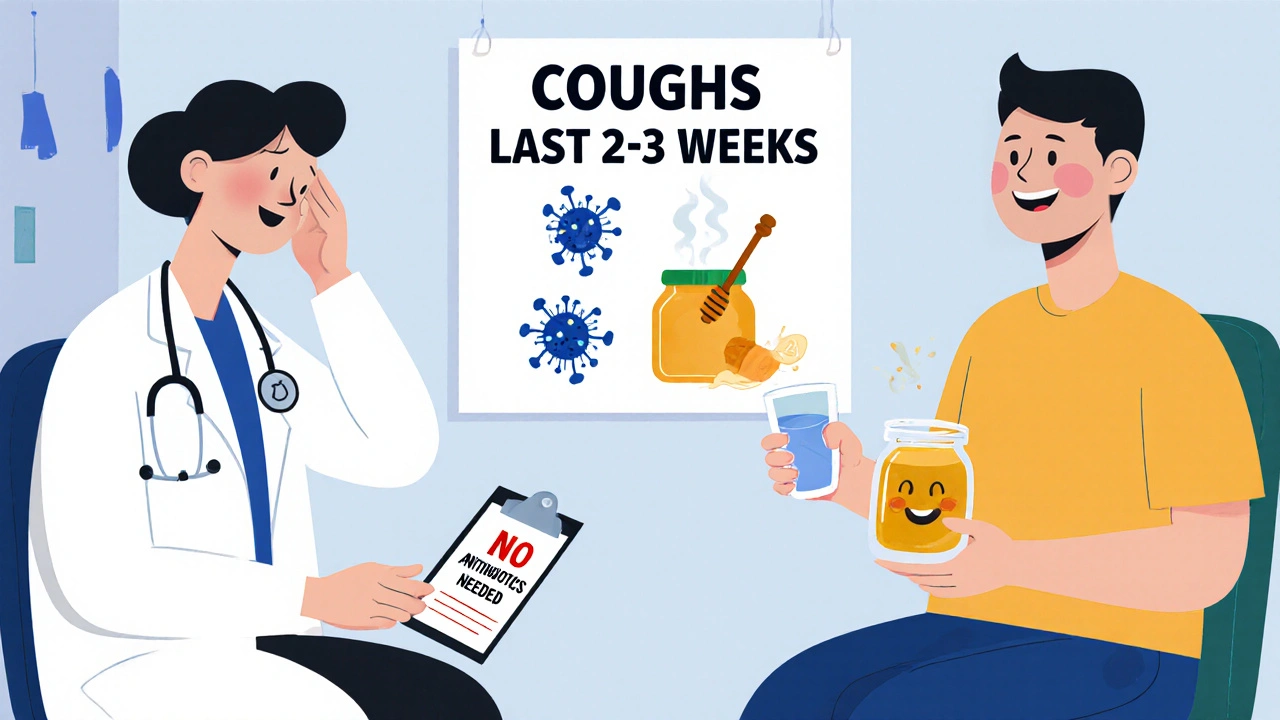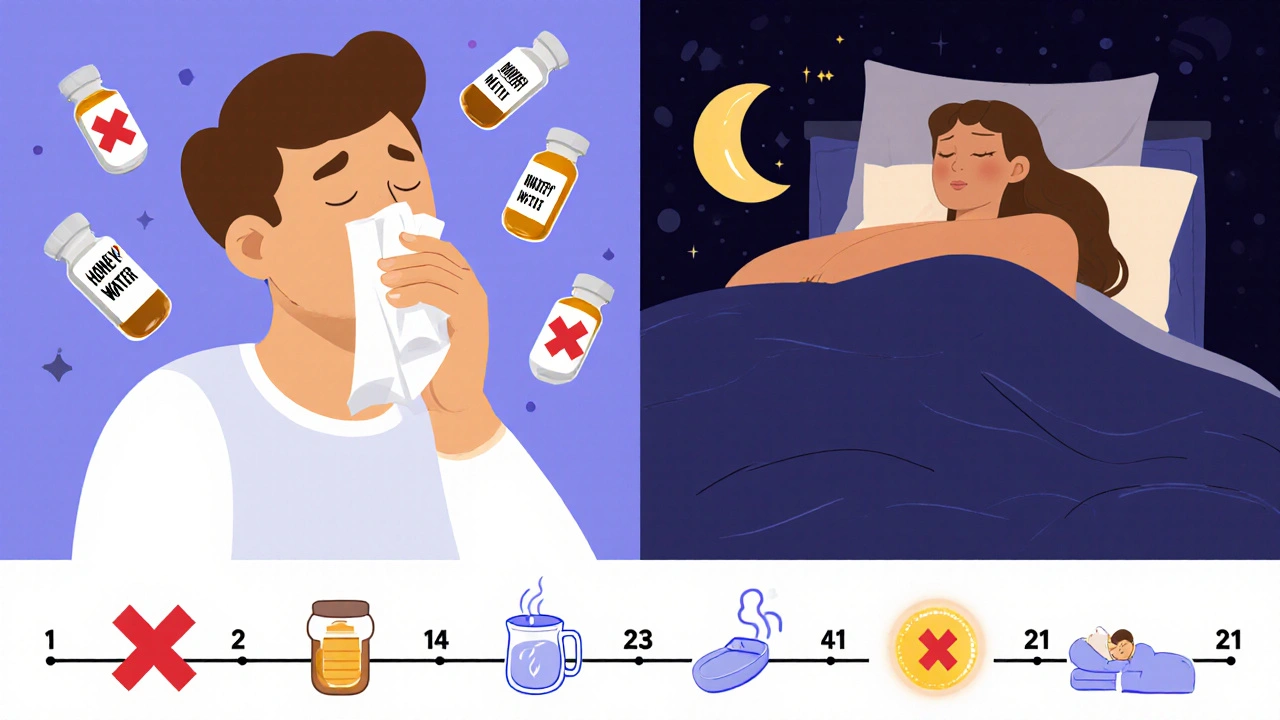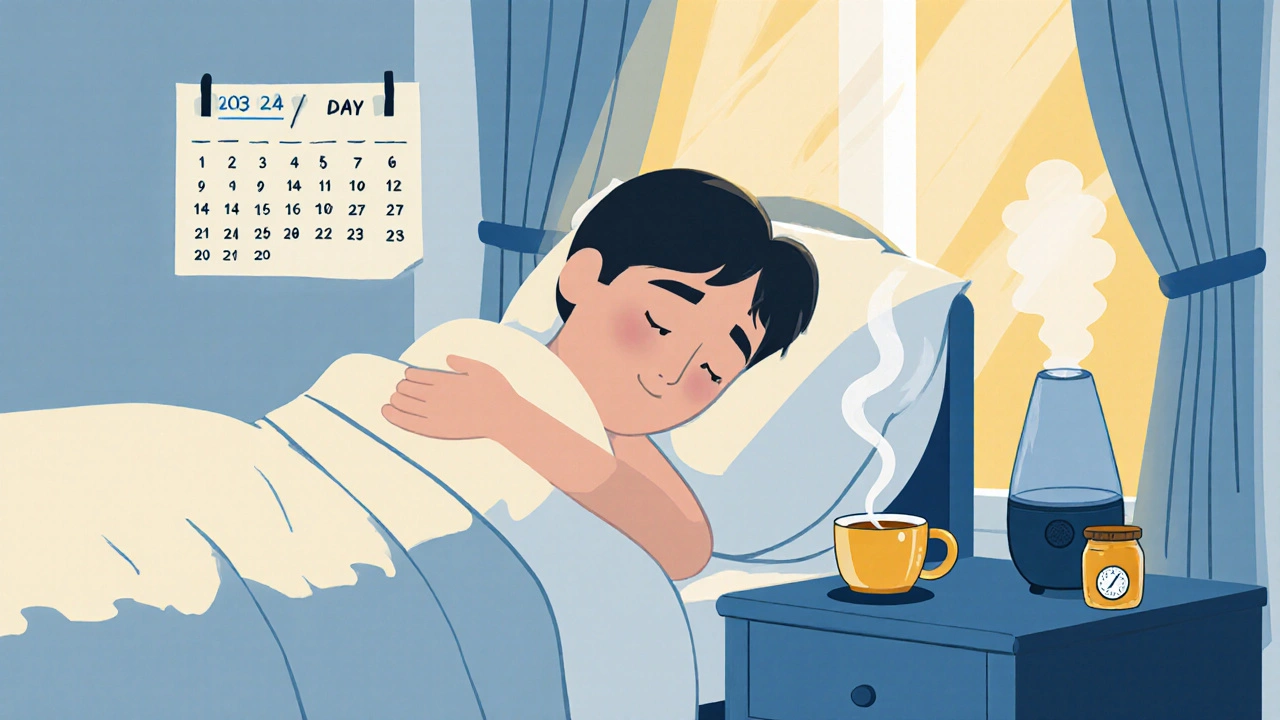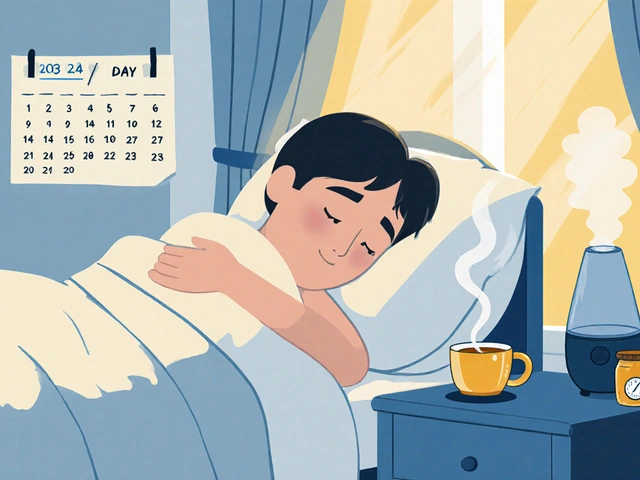Most people think a bad cough means they need antibiotics. It’s one of the most common reasons people show up at the doctor’s office. But here’s the truth: acute bronchitis is almost always caused by a virus - and antibiotics won’t fix it.
You get a cough. It starts after a cold. Maybe your chest feels tight. You’re hacking all night. You expect the doctor to hand you a prescription. But if you’ve got acute bronchitis, that prescription won’t make you feel better faster - and it might actually hurt you.
What Exactly Is Acute Bronchitis?
Acute bronchitis is an inflammation of the bronchial tubes - the airways that carry air to your lungs. It’s not pneumonia. It’s not the flu. It’s your body’s reaction to a virus, usually after a cold or upper respiratory infection. The main symptom? A cough that can last for weeks.
It’s not rare. About 5% of adults in the U.S. get it every year. That’s 10 million doctor visits annually. And in most cases, there’s no fever, no chills, no trouble breathing. Just a cough that won’t quit. You might cough up clear or white mucus. Sometimes it’s yellow or green - but that doesn’t mean you need antibiotics. Color doesn’t equal infection.
The most common viruses? Rhinovirus (the common cold), coronavirus, influenza, and respiratory syncytial virus (RSV). These aren’t treated with antibiotics. They run their course. And your body usually clears them on its own.
How Long Does the Cough Last?
This is where most people get frustrated. You expect to feel better in a few days. But with acute bronchitis, the cough sticks around.
Here’s what the data shows:
- After 10 days, half of people are still coughing.
- After 14 days, 26% are still coughing.
- After 21 days, 11% are still coughing.
A 2013 study found the average cough lasts 17.8 days. That’s over two and a half weeks. If your doctor says you should be fine in five days, they’re not being realistic. You’re not weak. You’re not failing. Your body just needs time.
That’s why waiting is part of the treatment. The American Academy of Family Physicians says: “Expect the cough to last 2-3 weeks.” Setting that expectation early stops people from demanding antibiotics.
Why Antibiotics Don’t Work (And Why They’re Dangerous)
Antibiotics kill bacteria. Acute bronchitis is caused by viruses - 90-95% of the time. That means antibiotics are useless. They’re like using a hammer to fix a leaky faucet.
Studies show antibiotics reduce cough duration by less than a day - just 0.6 days on average. That’s barely noticeable. But the risks? They’re real.
- One in 14 people who take antibiotics for bronchitis gets side effects: diarrhea, nausea, rashes, yeast infections.
- Antibiotics don’t prevent pneumonia in healthy adults. The number needed to treat (NNT) to prevent one case is 39 - meaning 38 people get antibiotics for no benefit, while one person might avoid pneumonia.
- Every unnecessary antibiotic increases the risk of antibiotic-resistant infections. In the U.S., 46 million unnecessary antibiotic prescriptions are given for respiratory infections like bronchitis each year. That’s a major driver of the global antibiotic resistance crisis.
The CDC, the American College of Chest Physicians, and the Infectious Diseases Society of America all agree: Don’t prescribe antibiotics for uncomplicated acute bronchitis. Yet, in 2022, over half of patients still got them. Why? Because patients ask for them. Because doctors feel pressured. Because it’s easier than explaining.

What Actually Helps? Evidence-Based Cough Care
If antibiotics won’t help, what will? Focus on comfort, not cure. Your body heals itself - you just need to support it.
1. Rest and Hydration
Drink plenty of fluids - water, broth, herbal tea. Aim for 8-10 glasses a day. Fluids thin mucus, soothe your throat, and help your body flush out the virus. Don’t force yourself to drink if you’re not thirsty, but keep water nearby.
Rest is just as important. Your immune system works better when you’re not running on empty. Skip the gym. Skip the extra shifts. Let your body focus on healing.
2. Honey for Cough Relief
Honey is one of the few cough treatments with solid proof. A 2018 study in JAMA Pediatrics compared honey to dextromethorphan (a common cough suppressant) and no treatment in children with upper respiratory infections. Honey worked as well as the medicine - and better than nothing.
For adults: Take 1-2 teaspoons (5-10 mL) of honey as needed, especially before bed. It coats your throat, reduces irritation, and may help you sleep.
Important: Never give honey to children under 1 year old. It can cause infant botulism - a rare but serious condition.
3. Dextromethorphan - Use Wisely
If you want to suppress the cough, dextromethorphan (found in Robitussin DM, Delsym) is the best over-the-counter option. It doesn’t cure anything, but it can reduce how often you cough.
Take 15-30 mg every 6-8 hours. Don’t exceed 120 mg in 24 hours. It’s not for everyone - avoid it if you’re pregnant, have liver disease, or take antidepressants.
4. Humidifiers and Steam
Dry air makes coughs worse. Use a cool-mist humidifier in your bedroom. It adds moisture to the air, loosens mucus, and soothes irritated airways.
If you don’t have one, try breathing steam from a bowl of hot water. Lean over it with a towel over your head. Breathe in slowly for 5-10 minutes. Be careful - don’t burn yourself.
5. Pain and Fever Relief
If you have a sore throat or mild fever, use acetaminophen (Tylenol) or ibuprofen (Advil). Stick to the recommended doses. Don’t exceed 3,000 mg of acetaminophen per day if you have liver issues. Ibuprofen can irritate your stomach - take it with food.
What Doesn’t Work (And Why to Avoid It)
Not everything you hear helps. Some treatments are myths - or worse, harmful.
- Guaifenesin (Mucinex): It’s supposed to thin mucus. But studies are mixed. Only 2 out of 7 trials showed any real benefit. Don’t waste your money.
- Inhaled bronchodilators (albuterol): Only help if you’re wheezing. If you don’t have wheezing, they won’t help your cough - and they can cause shaky hands, fast heartbeat, or anxiety.
- Codeine and prescription cough syrups: The FDA banned codeine for children under 12 in 2018. For adults, it’s rarely recommended - it’s addictive and doesn’t work much better than honey.
- Over-the-counter cold medicines for kids under 4: The FDA warns against them. They don’t work and can be dangerous.

When to See a Doctor
Most cases of acute bronchitis don’t need a doctor. But some signs mean something else is going on.
Call your doctor if you have:
- Fever higher than 38°C (100.4°F)
- Shortness of breath or wheezing that gets worse
- Cough lasting longer than 3 weeks
- Coughing up blood
- Weight loss, night sweats, or extreme fatigue
- Underlying lung disease like asthma or COPD
These could point to pneumonia, asthma flare-ups, or other conditions that need different treatment.
How to Talk to Your Doctor
If you go in with a cough, you might feel like you’re being judged if you don’t ask for antibiotics. But you’re not. You’re being smart.
Here’s what to say:
- “I’ve had this cough for 10 days. I know it’s probably bronchitis. Can we talk about what will actually help?”
- “I’ve heard antibiotics don’t work for this. Can we skip them unless something changes?”
- “Will I need to come back if it gets worse?”
Doctors who follow guidelines will appreciate you asking. And if they still push antibiotics? Ask why. If they say, “It’s just easier,” walk out. You deserve better.
What’s Changing in Bronchitis Care?
Things are slowly getting better. In 2010, 74% of bronchitis patients got antibiotics. By 2022, that dropped to 51%. That’s progress.
New tools are helping. Some clinics now use a 5-question survey to check patient expectations. Those who take it are 32% less likely to ask for antibiotics.
Doctors are also using “delayed prescriptions.” You leave with a script - but you’re told to wait 48-72 hours. If you’re not better, fill it. Most people don’t.
Future research is looking at ivy leaf extract and better tests to tell viral from bacterial infections. But for now, the best tools are rest, honey, fluids, and saying no to antibiotics.
The goal isn’t to cure bronchitis fast. It’s to let your body heal - without causing more harm than good.



King Over
November 20, 2025 AT 08:23Been there done that cough lasted 3 weeks no antibiotics needed just honey and sleep
Katie Magnus
November 22, 2025 AT 08:07OMG I CANNOT BELIEVE YOU’RE NOT TAKING ANTIBIOTICS WHAT IS THIS MADNESS I GOT A COLD LAST YEAR AND TOOK 3 DIFFERENT PRESCRIPTIONS AND STILL GOT WORSE LOL
Johannah Lavin
November 23, 2025 AT 08:16YESSSSS HONEY IS A MAGIC WAND 🍯✨ I give it to my kid every night when he coughs and he sleeps like an angel no meds needed. Also steam with eucalyptus is my secret weapon 💨❤️
Ravinder Singh
November 24, 2025 AT 14:15As someone from India where herbal remedies are part of daily life, I can confirm honey + warm turmeric milk works wonders. Antibiotics are overused everywhere. Your body knows how to heal - just give it space and hydration. 🙏
Ron and Gill Day
November 24, 2025 AT 14:28This post is so painfully naive. Of course antibiotics don't work for viruses - but doctors prescribe them because patients are idiots who demand them. The real problem is public ignorance, not medical malpractice. Also honey? Really? That's 18th century medicine.
Alyssa Torres
November 24, 2025 AT 21:42I’m so proud of how far we’ve come in patient education. When I first got bronchitis in 2015, my doctor handed me amoxicillin without even listening. Now I walk in and say ‘I know this is viral’ and they nod. Progress is slow but real 💪🌍
Summer Joy
November 25, 2025 AT 09:33So let me get this straight… you’re saying I shouldn’t take antibiotics for my cough? But what if I just want to feel better? I paid for the appointment! I deserve to feel better NOW. 🤬
Aruna Urban Planner
November 25, 2025 AT 19:46The epidemiological framing here is sound, but the cultural context is underdeveloped. In resource-constrained settings, delayed prescriptions are logistically untenable. The assumption of patient agency assumes access, education, and time - privileges not universally distributed.
Nicole Ziegler
November 26, 2025 AT 17:04Just used a humidifier last night and slept through the night for the first time in 10 days 😴💧 thank you for this post
Bharat Alasandi
November 28, 2025 AT 07:14Bro I was skeptical but honey + steam actually worked. My cough went from ‘can’t talk’ to ‘meh, it’s fine’ in 3 days. No rx needed. Also don’t listen to the haters - your body ain’t weak, it’s working.
Kristi Bennardo
November 29, 2025 AT 23:59This article is dangerously misleading. While it is true that antibiotics are often misused, dismissing them entirely without clinical oversight is irresponsible. Not every cough is viral. Some patients have atypical presentations. This is not a one-size-fits-all condition.
Shiv Karan Singh
November 30, 2025 AT 13:48Of course honey works. Everyone knows that. But what about the real problem? Doctors are lazy. They don’t want to explain. They just hand out pills like candy. And patients? They’re addicted to quick fixes. We’re all part of the problem.